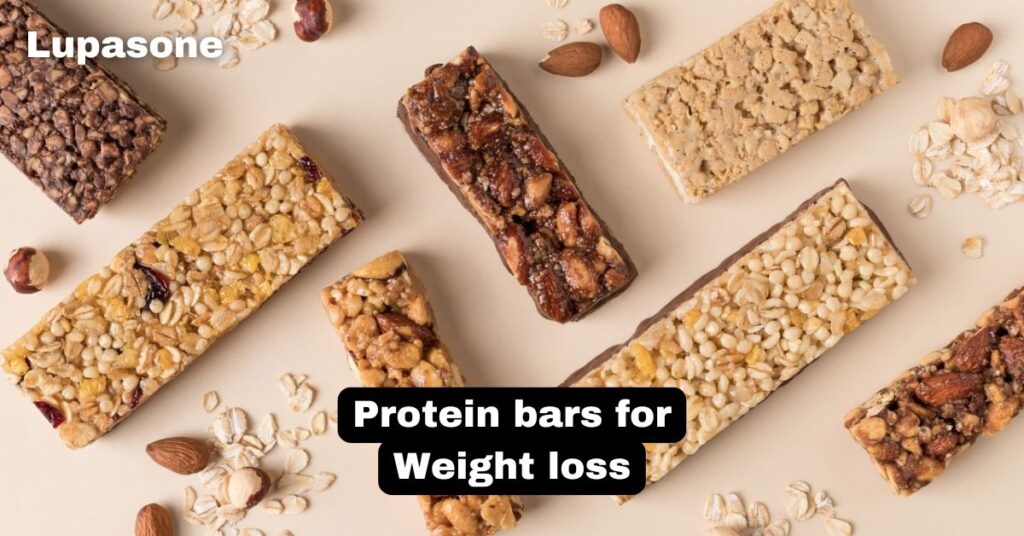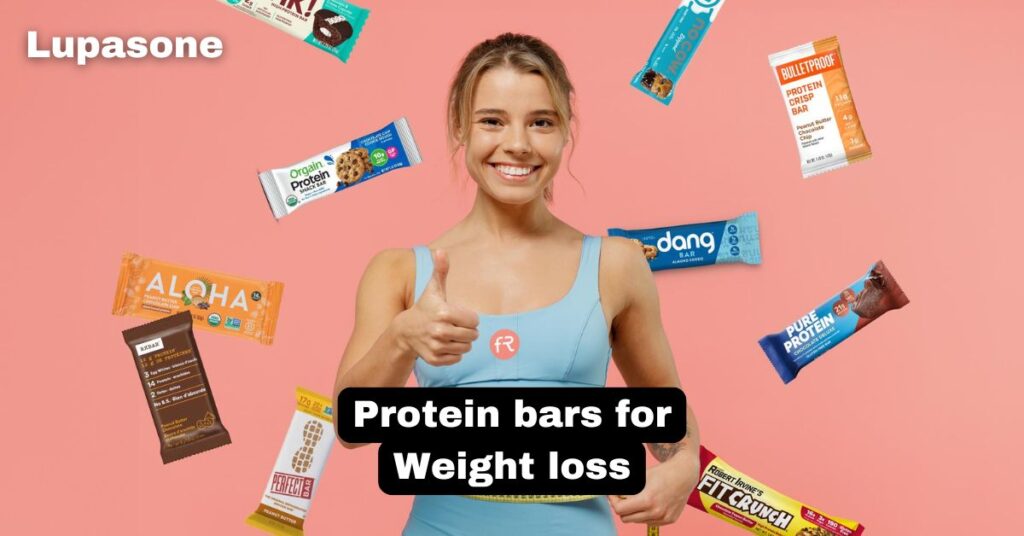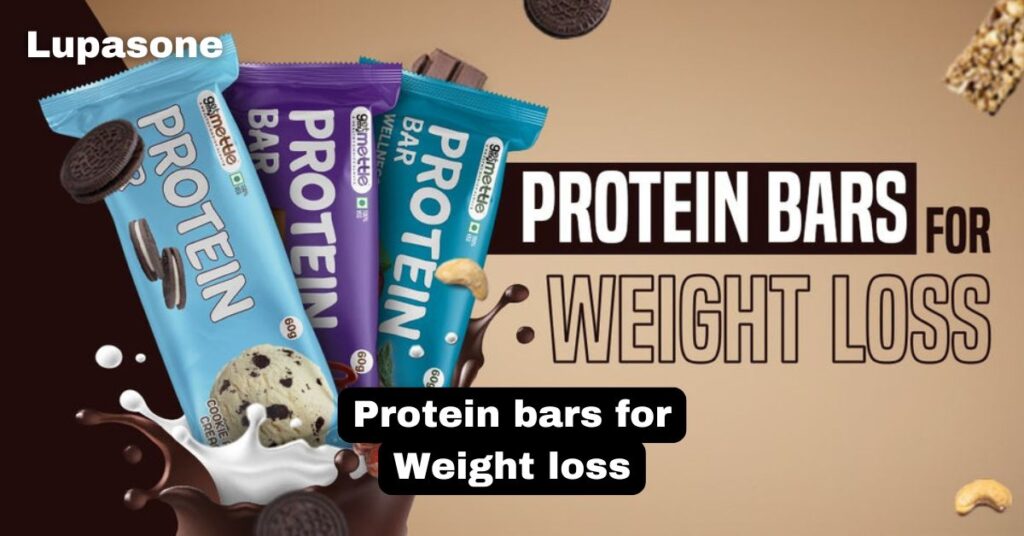
Contents
- 0.1 What Are Protein Bars?
- 0.2 How Can Protein Bars Help with Weight Loss?
- 0.3 Why Protein Bars Have Become Popular for Weight Loss
- 1 The Science Behind Protein and Weight Loss
- 2 Selecting the Best Protein Bars for Weight Loss
- 3 Popular Types of Protein Bars for Weight Loss
- 4 How to Incorporate Protein Bars Into Your Weight Loss Plan
- 5 Top Protein Bars for Weight Loss
- 6 FAQs About Protein Bars for Weight Loss
- 7 Conclusion: Are Protein Bars the Right Choice for Your Weight Loss Journey?
- 8 Takeaway Points
What Are Protein Bars?
Protein bars for weight loss are a convenient and nutritious snack or meal replacement option that is packed with protein. They often contain a blend of protein sources, such as whey protein, casein protein, or plant-based proteins like soy or pea protein. Protein bars can also include other ingredients like nuts, seeds, fruits, and whole grains.
How Can Protein Bars Help with Weight Loss?
Protein bars can contribute to weight loss in several ways:
- Satiety: Protein is a filling macronutrient that can help you feel full and satisfied for longer periods, reducing your overall calorie intake.
- Muscle Building: Consuming protein helps build and repair muscle tissue, which can boost your metabolism and help you burn more calories.
- Reduced Cravings: Protein can help regulate hunger hormones, reducing cravings for unhealthy snacks and sugary treats.
Why Protein Bars Have Become Popular for Weight Loss
Protein bars have gained popularity as a weight loss tool due to their:
- Convenience: They are easy to carry and consume, making them a great option for busy individuals or those on the go.
- Variety of Flavors: Protein bars come in a wide range of flavors, making them enjoyable and appealing to different tastes.
- Ease of Use: Protein bars can be a quick and easy way to get a nutritious meal or snack, especially for those who struggle to prepare meals or snacks on the go.
The Science Behind Protein and Weight Loss
The Role of Protein in Weight Management
Protein is a vital macronutrient that plays a crucial role in weight management. Here’s how:
- Satiety: Protein is a filling macronutrient that can help you feel full and satisfied for longer periods. This can reduce overall calorie intake and make it easier to stick to your weight loss goals.
- Muscle Preservation: When you’re trying to lose weight, it’s important to maintain muscle mass. By preserving muscle mass, you can boost your metabolism and burn more calories, even at rest.
- Metabolic Boost: Protein has a higher thermic effect of food (TEF) compared to carbohydrates and fats. This means your body expends more energy to digest and process protein, which can help you burn more calories.
Protein and Muscle Preservation
Muscle mass is a metabolically active tissue, meaning it burns calories even when you’re at rest. By preserving muscle mass during weight loss, you can help prevent your metabolism from slowing down. This is especially important as you lose weight, as a slower metabolism can make it more difficult to maintain your weight loss. Protein is essential for building and repairing muscle tissue, so it’s important to include it in your diet, especially during weight loss.
Protein’s Impact on Hormones
Protein can help regulate hunger hormones, such as ghrelin and leptin..By consuming adequate protein, you can help balance these hormones, reducing cravings and promoting satiety.
Protein and Thermogenesis
The thermic effect of food (TEF) is the amount of energy your body expends to digest, absorb, and process food. Protein bars for weight loss have a higher TEF than carbohydrates and fats, meaning your body burns more calories to digest them.
By incorporating protein into your diet, you can leverage its various benefits to support your weight loss efforts and maintain a healthy body composition.
Selecting the Best Protein Bars for Weight Loss
Protein Content – How Much Is Enough?
When selecting protein bars for weight loss, protein content is a crucial factor. Look for bars that contain at least 15-20 grams of protein per serving. This will help you feel full and satisfied, reducing overall calorie intake.
Calorie Count – Striking the Right Balance
While protein bars are generally considered a healthy snack option, it’s important to check the calorie count. Aim for bars with around 150-250 calories per serving. This will provide you with a satisfying snack without overindulging.
Fiber and Its Role in Satiety
Fiber is another essential nutrient in protein bars. Fiber can help you feel full and satisfied, reducing cravings and preventing overeating. Look for bars that contain a good amount of fiber, ideally at least 3-5 grams per serving.
Sugar and Artificial Ingredients
Be cautious of protein bars that are high in sugar or contain artificial ingredients. Opt for bars with natural sweeteners like honey, maple syrup, or fruit juice concentrate. Avoid bars that contain excessive amounts of added sugar or artificial flavors and colors.
Fat and Carbohydrate Balance
For those following low-carb or keto diets, it’s important to choose protein bars with a good balance of fats and carbohydrates. Look for bars that are low in carbohydrates and contain healthy fats like nuts, seeds, or nut butter.
By considering these factors, you can select protein bars that align with your weight loss goals and provide the nutrients you need to support a healthy lifestyle.
Popular Types of Protein Bars for Weight Loss

Whey Protein Bars
Whey protein is a popular choice for protein bars due to its high biological value, meaning your body can easily absorb and use it. Whey protein is a complete protein, containing all nine essential amino acids, which are essential for building and repairing muscle tissue.
Whey protein bars are often recommended for post-workout recovery, as they can help replenish your muscles and promote muscle growth. However, they can also be a convenient and nutritious snack option for weight loss.
Plant-Based Protein Bars
For vegans and those with lactose intolerance, plant-based protein bars are a great alternative. These bars are typically made from protein sources like pea protein, hemp protein, or brown rice protein. While they may not have the same amino acid profile as whey protein, plant-based protein bars can still provide a significant amount of protein and other essential nutrients.
Low-Carb and Keto-Friendly Protein Bars
If you’re following a low-carb or keto diet, there are plenty of protein bars available that are specifically designed to meet your needs. These bars are typically low in carbohydrates and high in protein and healthy fats. They can be a convenient and satisfying snack option for those on these diets.
Meal Replacement Protein Bars
Meal replacement protein bars can be a helpful tool for weight loss, especially if you struggle to prepare healthy meals or snacks. These bars are designed to provide a balanced meal in a convenient package, containing protein, carbohydrates, and healthy fats. However, it’s important to use meal replacement bars as part of a balanced diet and not as a sole source of nutrition.
Gluten-Free and Allergy-Friendly Protein Bars for Weight Loss
For individuals with food sensitivities, there are many gluten-free and allergy-friendly protein bars available. Look for bars that are labeled gluten-free, dairy-free, or soy-free to ensure they meet your dietary needs.
When choosing a protein bar, it’s important to consider your individual preferences, dietary needs, and weight loss goals. By selecting the right type of protein bar, you can enjoy a convenient and nutritious snack that supports your weight loss journey.
How to Incorporate Protein Bars Into Your Weight Loss Plan
When to Eat Protein Bars for Maximum Benefit
Protein Bars for Weight Loss can be a convenient and nutritious addition to your weight loss plan. Here are some suggestions for when to consume them:
- Post-workout: Protein bars can help replenish your muscles and promote recovery after intense workouts.
- Mid-morning or mid-afternoon snack: A protein bar can be a satisfying and healthy snack that helps prevent overeating between meals.
- Meal replacement: If you’re short on time or need a quick and easy meal option, a protein bar can be a convenient choice. However, it’s important to use them as a supplement to a balanced diet and not as a sole source of nutrition.
Replacing Meals vs. Snacking
Whether you should use protein bars as a meal replacement or a snack depends on your individual goals and calorie needs. If you’re trying to reduce your overall calorie intake, protein bars can be a helpful tool for replacing high-calorie meals. However, it’s important to ensure that your overall diet is balanced and provides all the necessary nutrients.
Portion Control and Calorie Tracking
Even though protein bars are a convenient and nutritious option, it’s important to practice portion control and track your calorie intake. While protein bars can help you feel full and satisfied, they still contain calories.
Combining Protein Bars with Whole Foods
While protein bars can be a valuable addition to your diet, it’s important to complement them with whole foods. Aim to include a variety of fruits, vegetables, lean proteins, and whole grains in your daily diet. This will ensure you’re getting a balanced range of nutrients and supporting your overall health.
Avoiding Over-Reliance on Processed Protein Bars
While protein bars can be a convenient and nutritious option, it’s important to avoid over-reliance on processed foods. Aim to get most of your nutrients from whole, unprocessed foods. Protein bars can be a helpful supplement, but they should not replace whole food sources of protein.
Top Protein Bars for Weight Loss

Best Protein Bars Based on Protein Content
When choosing a protein bar for weight loss, protein content is a crucial factor. Here are some of the best protein bars in terms of protein content:
- Quest Nutrition Protein Bar: Quest Nutrition bars are known for their high protein content, often containing around 20-22 grams of protein per bar. They come in a variety of flavors and are available in both regular and low-carb options.
- RXBAR: RXBARs are made with simple ingredients like nuts, egg whites, and fruit. They offer a good balance of protein, fats, and carbohydrates, and come in various flavors.
- Clif Bar: Clif Bars are a popular choice for athletes and active individuals. They provide a good source of protein, carbohydrates, and fiber.
- KIND Bars: KIND Bars offer a variety of protein options, including nuts, seeds, and fruit. They are a good source of fiber and can be a satisfying snack.
- Power Crunch Protein Bar: Power Crunch bars are known for their high protein content and low sugar content. They come in a variety of flavors and are a good option for those looking to fuel their workouts.
Best Low-Calorie Protein Bars
If you’re on a calorie-restricted diet, these low-calorie protein bars can be a helpful option:
- Think Thin: Think Thin bars offer a variety of flavors and are low in calories, making them a great choice for those looking to lose weight.
- Quest Nutrition Protein Bar: Many Quest Nutrition bars are low in calories and high in protein, making them a good option for weight loss.
- Nature Valley Protein Bar: Nature Valley offers a variety of protein bars with low calorie counts and natural ingredients.
- Pure Protein Bar: Pure Protein bars are low in calories and high in protein, making them a good option for those on a calorie-restricted diet.
- ONE Bar: ONE Bars are a popular choice for those looking for a low-calorie, high-protein snack.
Best Plant-Based Protein Bars
For vegans and those with dairy allergies, these plant-based protein bars are excellent options:
- Vega Protein Bar: Vega bars are made with plant-based protein and offer a variety of flavors and nutritional benefits.
- KIND Plant-Based Protein Bar: KIND offers a line of plant-based protein bars that are free from dairy, soy, and gluten.
- RXBAR Plant-Based: RXBAR offers plant-based protein bars made with ingredients like almonds, dates, and pea protein.
- LUNA Bar: LUNA bars are a popular choice for women and offer a variety of plant-based protein options.
- Lara Bar: Lara Bars are made with simple ingredients like nuts, fruits, and seeds, and offer a good source of plant-based protein.
Best Low-Sugar Protein Bars
If you’re looking to reduce your sugar intake, these low-sugar protein bars are a good option:
- Quest Nutrition Protein Bar: Many Quest Nutrition bars are low in sugar and contain natural sweeteners.
- Think Thin: Think Thin bars offer a variety of low-sugar options.
- Nature Valley Protein Bar: Nature Valley offers low-sugar protein bars that are made with natural ingredients.
- ONE Bar: ONE Bars are low in sugar and contain natural sweeteners.
- Pure Protein Bar: Pure Protein bars are a good option for those looking for a low-sugar protein bar.
Best Budget-FriendlyProtein Bars for Weight Loss
While protein bars can be a convenient and nutritious snack, they can also be expensive. Here are some budget-friendly options:
- Quest Nutrition Protein Bar: Quest Nutrition bars are often available at affordable prices.
- Nature Valley Protein Bar: Nature Valley bars are typically priced competitively.
- KIND Bar: KIND bars are a good option for those on a budget.
- Power Crunch Protein Bar: Power Crunch bars are often available at affordable prices.
- LUNA Bar: LUNA bars are a good option for those looking for a budget-friendly protein bar.
Remember, the best protein bar for you will depend on your individual needs and preferences. Consider your dietary restrictions, taste preferences, and weight loss goals when choosing a protein bar.
FAQs About Protein Bars for Weight Loss
Can protein bars help you lose weight?
Protein Bars for Weight Loss can be a valuable tool for weight loss when used in moderation and as part of a balanced diet and exercise plan. They can help you feel full and satisfied, reduce cravings, and provide a convenient source of protein. However, they are not a magic solution and should not be relied on solely for weight loss.
How many protein bars should I eat a day for weight loss?
The number of Protein Bars for Weight Loss you should eat per day depends on your individual needs and calorie goals. It’s generally recommended to use protein bars as a supplement to your diet, rather than as a primary source of nutrition. If you’re using protein bars as a meal replacement, aim for 1-2 bars per day. However, it’s important to consult with a healthcare professional or registered dietitian to determine the best approach for your specific needs.
What should I look for in a Protein Bars for Weight Loss?
When choosing protein bars for weight loss, look for the following:
- High Protein Content: Aim for bars with at least 15-20 grams of protein per serving.
- Low Calorie Count: Choose bars with a reasonable calorie count, typically around 150-250 calories per serving.
- Fiber Content: Look for bars with a good amount of fiber to help you feel full and satisfied.
- Natural Ingredients: Opt for bars with natural sweeteners and avoid those with excessive amounts of added sugar.
- Low Artificial Ingredients: Choose bars with minimal artificial flavors, colors, and preservatives.
Can I eat Protein Bars for Weight Loss as meal replacements?
Protein bars can be used as meal replacements, but it’s important to do so in moderation. They should not be your sole source of nutrition. It’s best to use protein bars as a convenient and nutritious option when you’re short on time or need a quick meal. However, aim to incorporate whole foods into your diet as much as possible for optimal health and weight management.
Are protein bars good before or after a workout?
Protein Bars for Weight Loss can be beneficial both before and after a workout. Consuming a protein bar before your workout can provide you with energy and fuel your muscles. After your workout, a protein bar can help repair and rebuild muscle tissue. Ultimately, the best time to consume a protein bar depends on your individual needs and preferences.
Conclusion: Are Protein Bars the Right Choice for Your Weight Loss Journey?
Summing Up the Benefits of Protein Bars
Protein Bars for Weight Loss can be a valuable tool for weight loss when used strategically. They offer several benefits, including:
- Convenience: Protein bars are easy to carry and consume, making them a great option for busy individuals or those on the go.
- Satiety: The protein content in protein bars can help you feel full and satisfied, reducing cravings and preventing overeating.
- Muscle Support: Protein is essential for building and repairing muscle tissue, which can help boost your metabolism and burn more calories.
- Variety: Protein bars come in a wide range of flavors and nutritional profiles, making it easy to find one that suits your preferences and dietary needs.
Final Recommendations
The best protein bar for you will depend on your individual goals and preferences. Here are some recommendations:
- Meal Replacement: If you’re looking for a quick and easy meal replacement, choose a protein bar with a higher calorie count and a balanced mix of protein, carbohydrates, and fats.
- Snack: For a satisfying snack, look for a protein bar with a lower calorie count and a good source of protein and fiber.
- Post-Workout: If you’re an athlete or exercise regularly, choose a protein bar with a high protein content to help your muscles recover.
- Dietary Needs: If you have specific dietary needs, such as being vegan or gluten-free, look for protein bars that meet your requirements.
Key Considerations
When choosing protein bars, it’s important to consider the following:
- Protein Content: Aim for at least 15-20 grams of protein per serving.
- Calorie Count: Choose bars with a calorie count that aligns with your weight loss goals.
- Ingredients: Look for bars made with natural ingredients and avoid those with artificial additives.
- Variety: Experiment with different brands and flavors to find the protein bars you enjoy the most.
By incorporating high-quality protein bars into your weight loss plan, you can enjoy a convenient and nutritious snack that supports your health and fitness goals.
Takeaway Points
Protein bars can be a valuable tool for weight loss when used strategically. By choosing the right protein bars and incorporating them into a balanced diet and exercise plan, you can:
- Boost satiety and reduce cravings: The protein content in protein bars can help you feel full and satisfied, reducing the urge to snack on unhealthy foods.
- Support muscle growth and repair: Protein is essential for building and maintaining muscle mass, which can help boost your metabolism and burn more calories.
- Provide a convenient source of nutrients: Protein bars can be a quick and easy way to get a dose of protein, fiber, and other essential nutrients, especially when you’re on the go.
However, it’s important to remember that protein bars are not a magic solution for weight loss. Be mindful of added sugars and artificial ingredients, and choose protein bars that are high in protein and low in calories. By incorporating protein bars into your weight loss plan in a balanced and mindful way, you can support your efforts to achieve your goals.
Visit home for more articles



